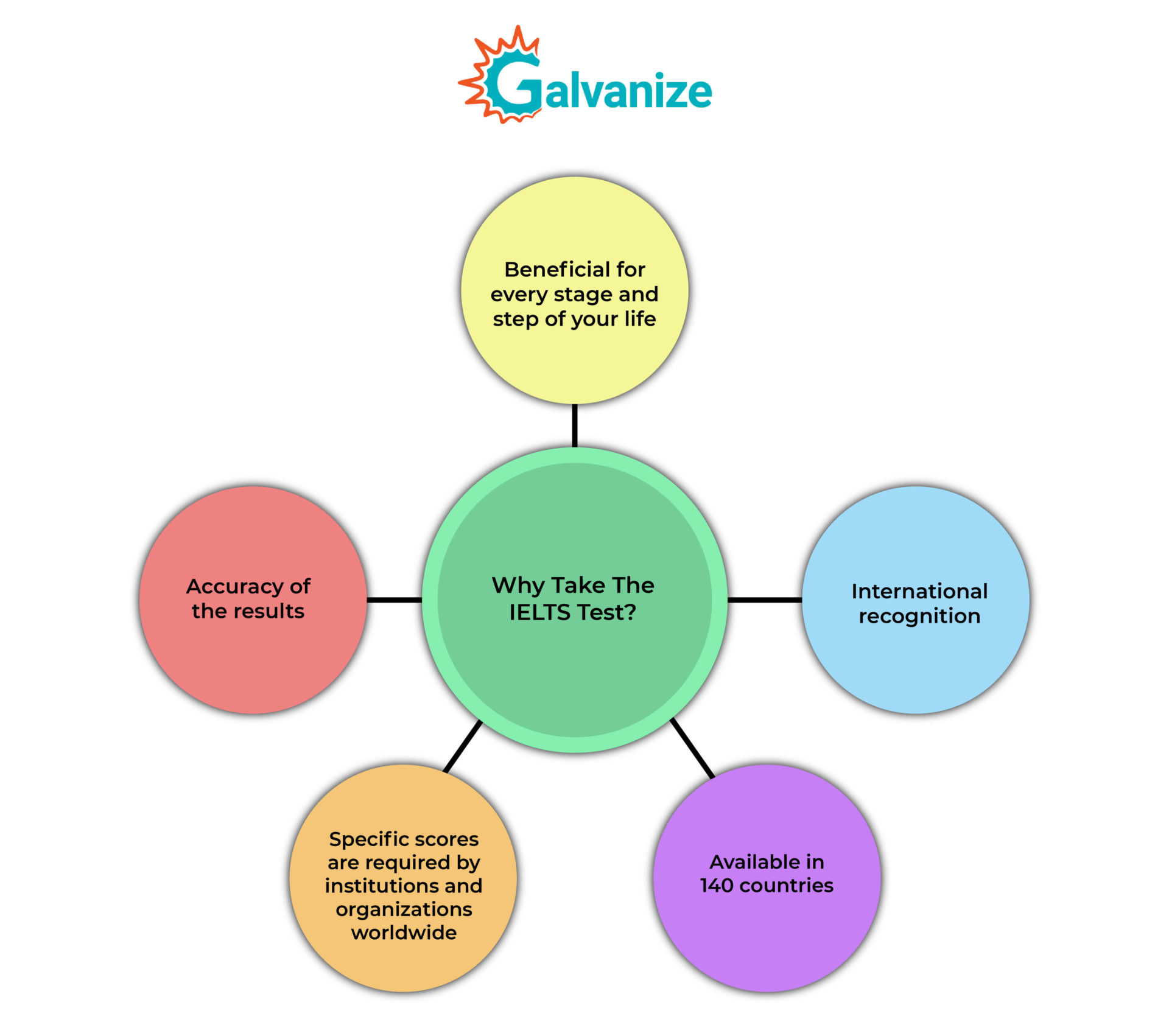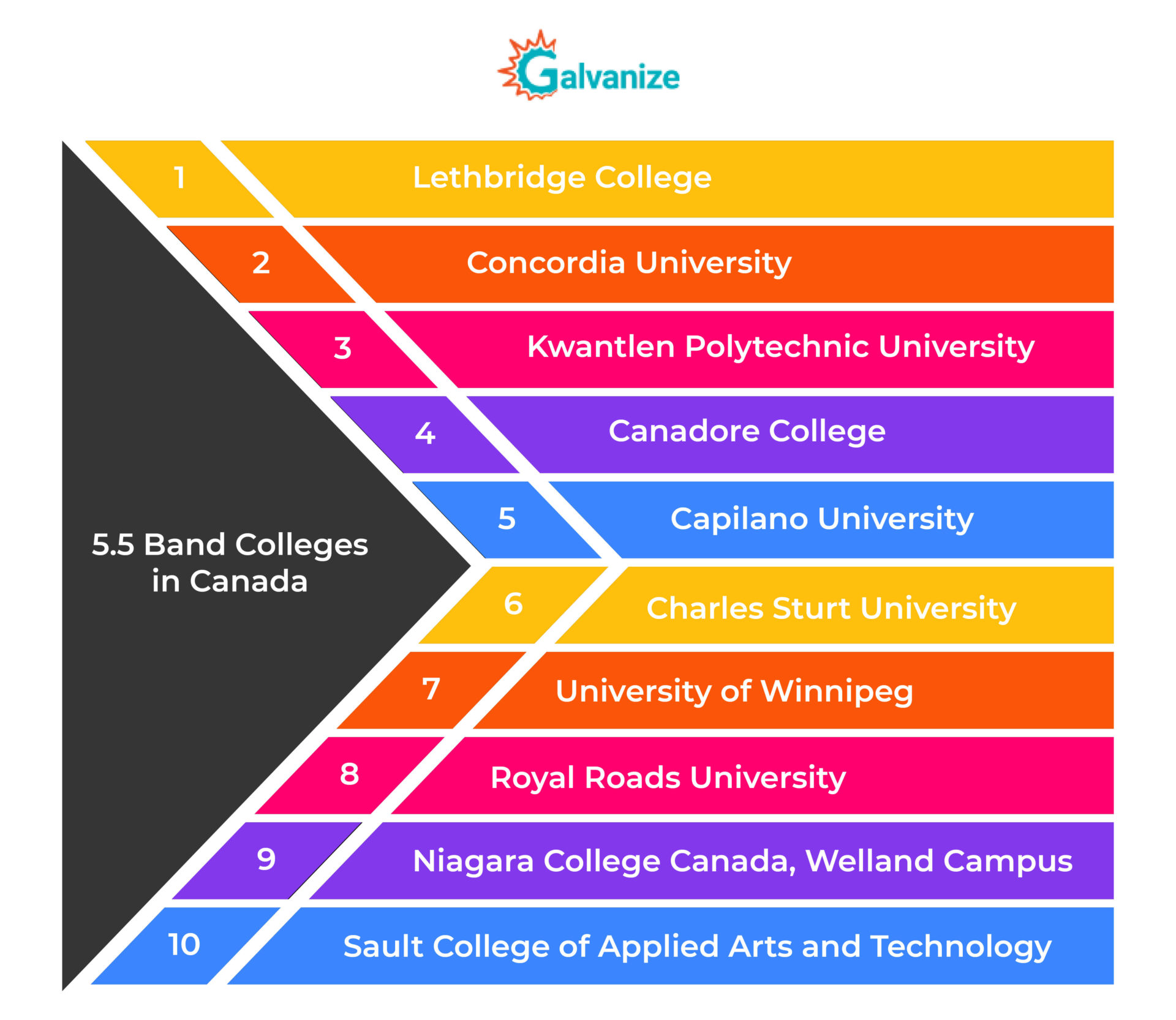
A Complete Guide To
5.5 Band Colleges in Canada
Chapter 1
Overview
Canada is home to a large number of prestigious universities and institutes that have earned it a reputation for providing world-class education in conjunction with cutting-edge facilities. For many non-native English speakers hoping to study in Canada, the IELTS or English language competency test can be an obstacle. It is challenging for students who do not achieve the required IELTS score of 6.0 to enrol in their desired program at their ideal university or college. Applications that do not fall within the average qualifying band are not accepted by universities.
So, are there any colleges that accept a 5.5 IELTS band score? Surprisingly yes! Read on to learn all about it.
Why Take The IELTS Test?
IELTS is among the most commonly demanded English language tests by businesses and educational institutions. It is widely recognised all over the world. Learn why taking the IELTS exam will benefit your future.
Beneficial for every stage and step of your life
You can apply to study at numerous international institutions, universities, employers, immigration authorities, and professional bodies after passing the IELTS exam because they all accept it as part of their admissions requirements.
International recognition
For educational, immigration, and business purposes, more than 9,000 institutions in more than 135 countries recognise IELTS as proof of English language proficiency. Due to the stringent quality control standards that each of its questions must meet, this English test is the most well-known worldwide in addition to having a positive reputation internationally.
Suitable training for your English language skills
You will already be using your English skills as though you were in a real-world environment with English native speakers if you take the IELTS exam. The test is made to evaluate your speaking, listening, writing, and reading abilities in addition to a live conversation with the examiner. This prepares you for talking with foreign classmates at school, people at work, or even strangers while travelling abroad.
Accuracy of the results
The IELTS examiners adhere to strict criteria for every test to provide an accurate assessment, so the outcome will accurately reflect your English language proficiency. Although there is no maximum score for “failed” or “approved,” most universities require scores between 6 and 7 points. IELTS results are scored according to a nine-band system. It will be advised that you take the exam again if your score is less than 5. Due to the 9-band system’s widespread adoption, results can be interpreted pretty consistently.
Specific scores are required by institutions and organizations worldwide.
A minimum score that you should have gotten to apply is frequently demanded when an institution, organization, or official body requires the IELTS test as a prerequisite for any application procedure. You may find out precisely which firms accept IELTS from the Global Recognition System IELTS, as well as the minimal score requirements for each of them.
Available in 140 countries
You can take the IELTS exam in one of 900 British Council-approved locations worldwide with dates soon becoming consistently available all year long. You can easily register online, and the British Council office in your nation will process it and deliver it to the closest testing facility after processing it. 13 days after the test is finished, the findings are released, and upon request, they can also be given directly to a facility or organisation.
Is 5.5 IELTS band score bad?
5.5 IELTS band score is a below-average score. It is recommended that candidates for Canadian immigration have a minimum score of 6.5 in each band and an aggregate score of 7 or above. Most international education advisors advise students to try for a higher score. Even so, some reputable universities in Canada continue to accept 5.5 band scores. Read about them in the section below.
Can I go to Canada without IELTS?
For a study visa in Canada, you used to need a minimum of 5.5 in each segment and a score of 6.0 in total, but that criterion has since been eliminated. You can now apply for a student visa to Canada without providing an IELTS score. However, you must show proof of acceptance from a Canadian institution, you would already have this information if you were applying for a study permit. Therefore, you no longer have to worry about meeting the IELTS requirements for a study permit if you obtained a score of 5.5.
Chapter 2
5.5 Band Colleges in Canada :
#1. Lethbridge College :
The first Lethbridge College campus opened its doors in 1957 under the name Lethbridge Community College. The first college in Canada to be formed by the general public was this one. The Alberta Rural Development Network counts the college as a member. The college belongs to the AACTI, CCAA, ACCC, and CBIE. In more than 50 career categories, the college offers preparatory courses, vacation training, and programmes for university transfer that can lead to one-year certificates, two-year diplomas, bachelor’s degrees, and apprenticeship programmes.
#2. Concordia University :
The Concordia University was founded in 1974. A public research university called Concordia is situated in the centre of Canada’s renowned metropolis of Montreal. In Canada, Concordia University is renowned for its adaptable learning style and dedication to using both teaching and research to examine societal challenges from a broad viewpoint. For both domestic and foreign students, the university is ranked among the best universities and colleges in Canada and Quebec.
#3. Kwantlen Polytechnic University :
Kwantlen Polytechnic University was founded in 1981 after separating from Douglas College. There are 1,400 academic staff members and 20,000 students overall. It is one of the largest institutions in British Columbia, Canada, in terms of enrollment, with a total of 5 sites serving the Metro Vancouver region. More than 120 different fields of study are covered by the university’s several bachelor’s, associate’s, certificate, diploma, apprenticeship, and citation programmes. For employees and skilled technicians, there are many vocational programmes available, including those in engineering, nursing, accountancy, business administration, criminology, architecture, and medicine. But for undergraduates, it functions more or less like a polytechnic institution.
#4. Canadore College :
As a branch campus of Cambrian College of Sudbury, Canadore College was established in 1967. In 1972, it received autonomous independence. Its 650-acre site is covered in lush greenery. Eight sites make up Canadore College, including 4 urban campuses in Mississauga, Scarborough, Brampton, and Toronto as well as the College Drive Campus, Commerce Court Campus, Aviation Campus, and West Parry Sound Campus. The options for students include cricket, ice hockey, volleyball, and soccer. Canadore is an excellent example of Canada’s vibrant sports culture. One of Ontario’s highest graduation rates is found at Canadore.
#5. Capilano University :
Capilano University was founded in 1968 and is a Northwest Commission on Colleges and Universities-accredited open university. In 2008, it was granted university status. The educational boards of West Vancouver, North Vancouver, and Howe Sound are reported to have held a vote to establish the university. Capilano University started out with 784 students. Paul Dangerfield, the institution’s first president, chose the blue and white colour scheme for the university’s emblem. The university’s name was chosen from suggestions provided by North Shore citizens and authorised by the provincial government.
#6. Niagara College Canada, Welland Campus :
Niagara College was established in Welland in 1967 to provide students more programs focused on careers. This was the first institution in Canada to provide courses in winemaking and brewing. As tourism grew in Canada, the institution established the Tourism Industry Development Center (TIDC) to provide students with training in the industry
#7. Sault College of Applied Arts and Technology :
The prestigious Canadian college Sault College provides more than 150 programmes, degrees, distance learning, professional training, online, and post-secondary programs. The college’s main goal is to offer modern, hands-on education in a welcoming environment. 4,500 part-time students and over 2,400 full-time students reside there. The college continues to have a February 1st deadline for all programme applications.
#8. Charles Sturt University :
Australia’s finest public university, Charles Sturt University, is one of the best in the world. Charles Napier Sturt served as the inspiration for the 1989 establishment. Australia is home to several campuses for the institution, including those in Wagga Wagga, Orange, Bathurst, Dubbo, Port Macquarie, and Canberra, Parramatta, and Goulburn. Australia’s first accredited carbon-neutral institution is Charles Sturt. Every year, the institution serves about 44,000 students from all over the world, not just those from Australia, with its 100 years of educational experience.
#9. University of Winnipeg :
A public research institution, the University of Winnipeg is also recognized as UWinnipeg and U of W. It was founded in 1967, the same year that United College was granted a charter. College has both undergraduate and graduate programmes. It provides more than 400 courses in more than 40 subject areas. More than 600 foreign students from 68 different countries are now enrolled at the university. The most well-liked college activities are skiing, hockey games, and kayaking. Through bursaries, awards, prizes, and scholarships, the University of Winnipeg’s access and excellence mandates are supported financially by the Awards & Financial Aid Office. Awards and bursaries are typically provided to students who demonstrate financial necessity.
#10. Royal Roads University :
Royal Roads University is a public, research-focused university located in Colwood, British Columbia, Canada. It was established in 1995. The institution is located on the premises of the former Royal Roads Military College, which was in operation until 1995 when it received university status and the authority to award professional degrees. It is a member of reputable groups including the International Association of Universities and the Canadian Bureau for International Education.
5.5 Band Colleges in Canada Cut Off (Section-wise) :
|
University Name |
Required IELTS Score |
Reading |
Listening |
Speaking |
Writing |
|
Camosun College |
Average score of 6.0. Band below 5.5 are not acceptable |
5.5 |
5.5 |
5.5 |
5.5 |
|
Champion College |
Average score of 6.5. Band below 5.5 is not acceptable |
5 |
5 |
5 |
5 |
|
Athabasca University |
Average score of 6.5. Band below 5.5 is not acceptable |
5 |
5 |
5 |
5 |
|
The University of Alberta |
Average score of 6.5. Band below 5.5 is not acceptable |
5.5 |
5.5 |
5.5 |
5.5 |
|
Charles Sturt University |
Average score of 6.0. Band below 5.5 are not acceptable |
5.5 |
5.5 |
5.5 |
5.5 |
|
St. Clair College of Applied Arts and Technology |
Average score of 6.0. Band below 5.5 are not acceptable |
5.5 |
5.5 |
5.5 |
5.5 |
|
Huron University College |
Average score of 6.5. Band below 5.5 is not acceptable |
5 |
5 |
5 |
5 |
|
Brock University |
Average score of 6.5. Band below 5.5 is not acceptable |
5.5 |
5.5 |
5.5 |
5.5 |
|
MacEwan University |
Average score of 6.5. Band below 5.5 is not acceptable |
5.5 |
5.5 |
5.5 |
5.5 |
|
Lethbridge College |
Average score of 6.0. Band below 5.5 are not acceptable |
5.5 |
5.5 |
5.5 |
5.5 |
Documents Required for Application Process :
To get admission to these universities, you will need the following documents:
- Application Form
- Curriculum vitae
- Statement of purpose
- School certificates and college mark sheets
- Health Insurance
- Proof of bank statements
- Valid Passport or Permanent Resident Card
Conditions to Apply in These Universities :
Take CanTEST
Those who don’t have the minimal IELTS score required by some universities or colleges must take the CanTEST once they’ve arrived at the university.
English as a Second Language (ESL) Program
Before enrolling in post-secondary programmes, the student must enrol in the St. Clair College English as an ESL (English as a Second Language) programme if they are unable to clear the CanTEST.
Submit MOI
Students with an IELTS score of 5.5 may use documentation or a certificate from their prior institution attesting that English was the language of instruction for the course to demonstrate their English language proficiency. It is advised, nevertheless, that you contact the universities directly before submitting an application for any degree programme or certification.
Visa Process
It is required to get a study permit if one plans to pursue an education in Canada. Indian citizens must submit an application to the Citizen and Immigration in order to acquire a Canadian visa. There are two primary routes to apply for immigration to Canada, including the standard process for requesting a study permit or the student direct stream. Indian students typically choose the first option, which involves applying for study permission to immigrate to Canada. The application process for a study permit in Canada costs $150. (INR 8,400).
Conclusion :
Canada has a lively culture, and its economy is flourishing at its peak. The universities in Canada set minimal standards for a variety of programmes to ensure that international students have no trouble assimilating to the English-speaking environment. The standard for the top colleges is frequently an average 6.5 band with a minimum of 6 in every section. This grade is required for all undergraduate courses, including those leading to a diploma. The demand for the IELTS band might also be as high as 7 in engineering schools or in teaching or educational methods.
Related Blogs
- Top Business Schools in Canada
- Intakes in Canada
- Part Time Jobs in Canada
- Cheap Universities in Canada
- One Year Courses in Canada
- Canadian PNPs
- MS in Canada for Indian Students
- Phd in Canada
- Top CS Universities in Canada
- MIM in Canada
- Affordable Business Schools in Canada
- Best Cities to live in Canada
- Colleges in Montreal Canada
- Top Universities in Canada for MS













I’ve been considering studying in Canada for a while now, but I wasn’t sure how to go about getting a study visa. Your post has answered all of my questions and given me a clear understanding of the process. I appreciate the resources and links you’ve provided as well. Thank you!